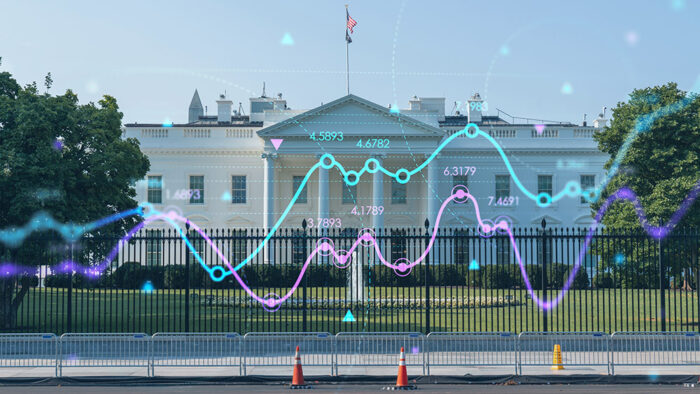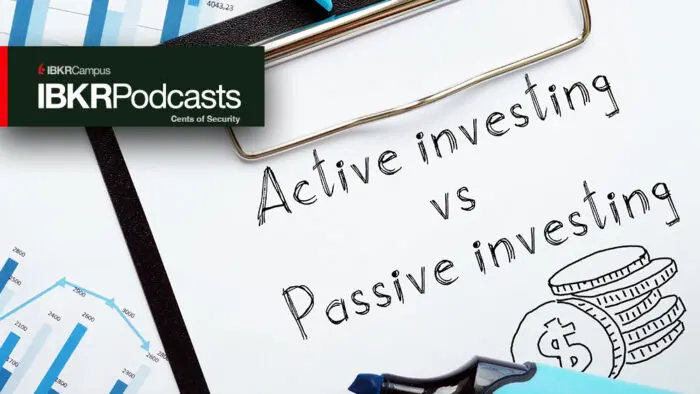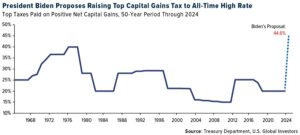It’s first-quarter earnings season. Let it be said at the outset that the sum will be greater than the parts.
Every corporate earnings report will become part of a macro mosaic that will help investors determine if this great bull market rallies ever higher—or if the options market’s nascent bearishness is a leading indicator of what comes next.
The situation is acute because so many investors are wondering how much strong economic data and rising commodity prices will influence the Federal Reserve’s decision to lower interest rates.
Until recently, it was commonly thought that stocks would decline, if not plunge, in the absence of lower rates. After all, the past two decades have demonstrated that low interest rates are an important precondition of rising stock prices and muted options volatility. But economic data has been so strong since January that the Street has lowered its rate cut expectations from seven to three or fewer. Some even wonder if there will be any rate cuts.
Despite the uncertainty, stocks have set successive record highs, surprising many investors who, with the 10-year Treasury yield firmly above 4%, were worried that the opposite would happen. This makes earnings reports important to the market’s trajectory—and not just a reflection of a single stock or sector.
A good earnings report and outlook from a financial company, for instance, might not trigger the same secular enthusiasm as it would in the past. Instead, investors will read through whatever is reported by banks to try to better determine if the results might influence the Fed’s interest-rate decisions. The Fed’s rate-setting committee will conclude its next two-day meetings on May 1 and June 12.
The options market is already pricing this earnings season as a high-volatility event, reflecting the confusion over the future of rates and inflation.
The average S&P 500 index stock’s one-month implied volatility—or expected volatility—is at 29, near a 52-week high. Conversely, realized volatility—what happened in the past—is at 23, according to Goldman Sachs derivatives strategists.
The spread between implied and realized volatility means that the fear and greed premiums in put and call options are elevated ahead of earnings season. Some of this is normal, as volatility always increases around events with uncertain outcomes, but much of it reflects the added risk of the particular moment, be it a continuation of the bullish trend or a turn in sentiment.
Goldman’s strategists have told clients that they have seen an increase in defensive put buying in all sectors except energy, which has attracted upside speculation.
This will shock many people who erroneously regard the Cboe Volatility Index or VIX, as the definitive indicator of options volatility. The fear gauge, as the VIX is known, has been characterized as muted at its current level of 16, but too few people understand that VIX expresses the implied volatility of the S&P 500, not single-stock volatility.
Volatility analysis is complicated, but know this: At 16, the options market is pricing the S&P 500 as if it will move 1%, up or down, each day until expiration. At 29, the options market is pricing the index’s components as if they will move 1.81%, up or down.
Institutional investors and central bankers are unusually data-dependent right now, and thus managing risk—rather than taking risky positions on individual names by gambling on earnings reports—should be investors’ primary concern.
Investors rarely like to be told to be patient and cunning, but that is the message when elevated options volatility is too expensive to buy and too cheap to sell. Let each earnings report bring forth new information that can be synthesized to provide a clearer macro picture, and hopefully a meaningful investment edge.
—
Originally Posted April 10, 2024 – Stocks’ Gains Are Scaring Options Traders. Earnings Are Critical.
Disclosure: Interactive Brokers
Information posted on IBKR Campus that is provided by third-parties does NOT constitute a recommendation that you should contract for the services of that third party. Third-party participants who contribute to IBKR Campus are independent of Interactive Brokers and Interactive Brokers does not make any representations or warranties concerning the services offered, their past or future performance, or the accuracy of the information provided by the third party. Past performance is no guarantee of future results.
This material is from Barron's and is being posted with its permission. The views expressed in this material are solely those of the author and/or Barron's and Interactive Brokers is not endorsing or recommending any investment or trading discussed in the material. This material is not and should not be construed as an offer to buy or sell any security. It should not be construed as research or investment advice or a recommendation to buy, sell or hold any security or commodity. This material does not and is not intended to take into account the particular financial conditions, investment objectives or requirements of individual customers. Before acting on this material, you should consider whether it is suitable for your particular circumstances and, as necessary, seek professional advice.
Disclosure: Options Trading
Options involve risk and are not suitable for all investors. Multiple leg strategies, including spreads, will incur multiple commission charges. For more information read the "Characteristics and Risks of Standardized Options" also known as the options disclosure document (ODD) or visit ibkr.com/occ


































Join The Conversation
If you have a general question, it may already be covered in our FAQs. If you have an account-specific question or concern, please reach out to Client Services.